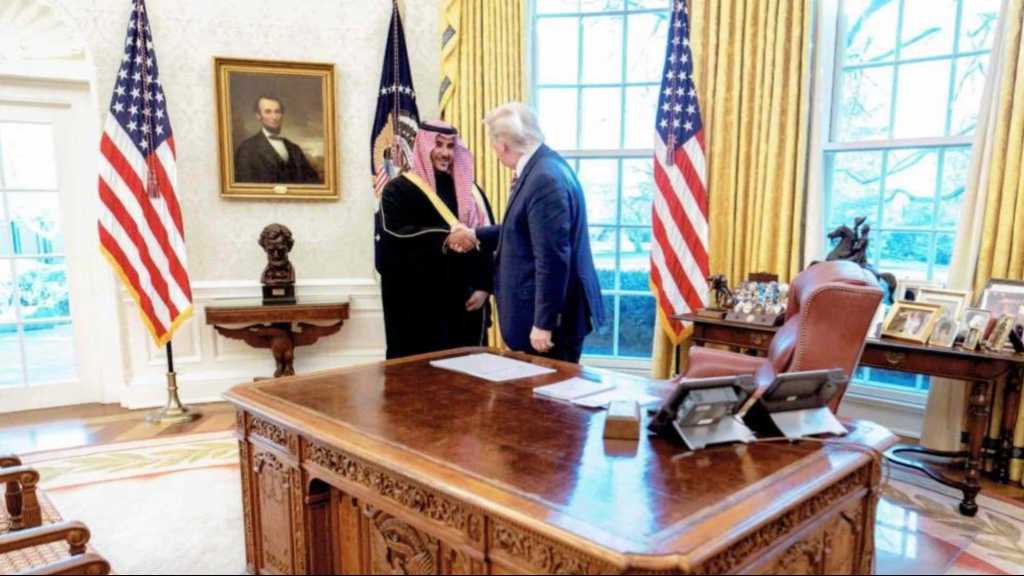
Nervous Saudis Try to Ease Middle East Tensions

By Patrick Wintour – The Guardian
Saudi Arabia has sent a message to Washington and London that it wants to see a de-escalation of the United States’ struggle with Iran, in a sign that Saudi is nervous about its vulnerability to Iranian missile strikes – and still uncertain about the reliability of Donald Trump’s long-term commitment to his Gulf allies.
The tone has been sent out in an array of diplomatic tweets since the assassination of General Qassem Soleimani, but also conveyed personally by the Saudi Arabian deputy defense minister, Prince Khalid bin Salman.
He held meetings this week with Trump and Jared Kushner, the president’s son-in-law, in Washington and then in London with the defense secretary, Ben Wallace; Britain’s senior defense adviser for the Middle East, Lt Gen Sir John Lorimer; and the prime minister’s foreign policy adviser, David Quarrey. He also met senior figures in the Foreign Office.
The White House, in a break with protocol, only confirmed the meeting with Trump after the Saudi side had tweeted pictures of the meeting.
The meetings, and de-escalation message, echoed by other oil-rich Gulf States such as the United Arab Emirates [UAE], came at the point of maximum concern that the Iran-US standoff could turn into a full-scale conflagration.
Analysts said the message from Riyadh would have been that it did not want its territory to be in the frontline of any assault on Iran – even if it knew it could not avoid involvement if the conflict developed.
In the critical days after the assassination of Soleimani, many Iranian commanders warned the Gulf States of the consequences if their territories became a launchpad for strikes on Tehran. Dubai would be the first city targeted, one said.
Saudi Arabia’s vulnerability to Iran was exposed in September by the drone and missile attack on Saudi Aramco oil facilities in Abqaiq and Khurais. Riyadh was surprised the attack did not prompt any military response from the Trump administration, even though US intelligence declared Iran was responsible and the White House described the attack as a declaration of war.
An as-yet unpublished UN report is expected shortly to confirm the American assessment indirectly by rejecting the claim by Ansarullah in Yemen that they had been responsible for the attack. The UN report also concluded that the attack came from the north, and the weaponry was of a sophistication that ruled out the Ansarullah.
But the publication of the UN report, four months after the attack, will only serve as a reminder to Riyadh of American unreliability. Trump was not prepared to strike to defend Saudi oil infrastructure, but was willing to risk killing Iran’s most senior military figure after the US embassy compound was stormed in Baghdad.
The episode only confirmed Trump’s claim in October that Saudi Arabia “would not last more than two weeks” without US military protection.
Even in celebrating the killing of Soleimani on Wednesday, an episode the Saudis instinctively celebrate, Trump underlined he wanted NATO to replace some US troops in the Middle East – an idea he referred to as “NATO ME”. He also stressed that the umbilical cord tying the US to the Middle East – oil – had been cut. The US was self-sufficient in energy, he said – a half-truth but one he believes.
This does not leave the Sunni states facing an immediate American withdrawal – the actual number of US troops in the region is increasing – but it may require rebuilding some damaged alliances.
Indeed, there has been a year-long trend in Riyadh to try slowly to dial down some of the conflicts in which it has embroiled itself including Yemen, with its Gulf neighbor Qatar, and, more broadly, with Iran. In the context of the Saudis chairing the G20 this year, Riyadh wants a less confrontational image. Female drivers, concerts by Swedish House Mafia and the promise of mass tourism is not enough.
So Riyadh has emphasized it can see a role for the Ansarullah in a future Yemen government. The number of Saudi airstrikes has been cut by 80%, and the UAE has largely pulled its troops out.
Riyadh has edged closer to ending the fruitless two-year boycott of Qatar, a dispute as much about prestige as substance, as it seeks to prevent its neighbor cementing an alliance with Iran. It will not escape Saudi Arabia’s notice that Qatar – home to a US airbase that would be a potential launchpad for any American war against Iran – did not hide its loyalties. Within a day of the killing, Qatar’s foreign minister visited Tehran, met President Hassan Rouhani and offered his condolences. “Qatar understands the deep pain and sadness that the Iranian people and government are enduring,” he said.
As to easing Saudi-Iranian tensions, it has even been claimed by Iraqi Prime Minister, Adel Abdul-Mahdi, that he had been scheduled to meet Soleimani the morning he was killed. He said Soleimani was carrying a message from Iran’s supreme leader in response to a Saudi message relayed through Iraq to Iran about “important agreements and breakthroughs in Iraq and the region”. The account has been ridiculed by Mike Pompeo, the US secretary of state, and not verified by the Saudis.
But it has been the persistent theme of Iranian foreign policy that the whole region would benefit from the removal of US troops from the region, starting in Iraq. Javad Zarif, Iran’s foreign minister, appealed this week to all countries situated around the strait of Hormuz to form an alliance, saying: “We – all of us, let me underline – should abandon the paradigm of elimination and antagonism premised on the illusion of purchasing security and development from without.”
Global think-tanks are littered with reports setting out the path to a Saudi-Iran rapprochement, and perhaps the best that can be secured in the foreseeable future is a limited non-aggression pact. That would be an advance on all-out war.
Comments



